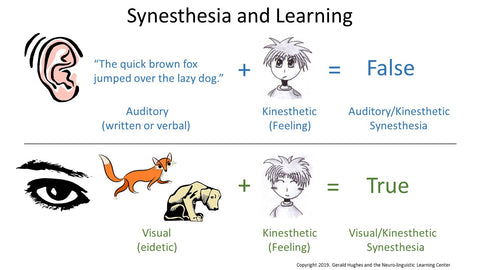Your cart is currently empty.

Synesthesia, Education, and Making Good Decisions
At the Neuro-linguistic Learning Center, we've observed that the phenomenon of synesthesia is a critical element to the learning and decision-making process. It is the phenomenon of Synesthesia that creates a sense of ‘knowing’ whether information is correct or incorrect and whether a choice is right or wrong.
And yet, in all of my years as a student, as a parent, and as a Learning Specialist, I have not once, ever heard a Teacher, Tutor, or other Educational Professional refer to or discuss the phenomenon of synesthesia as it applies to a child's education!
So, for those Teachers, Tutors, and Parents who are not yet familiar with the term, synesthesia, it is generally defined as “a union of senses”, that being, an individual experiencing two senses or sensory modalities simultaneously.
This might be auditory (musical) and visual (in the form of color). It might be olfactory (smell) and numerical or spatial and gustatory (taste). There is a well-know and fascinating book on synesthesia called, "The Man Who Tasted Shapes".
With respect to a child's education, the two forms of synesthesia that appear to be most relevant to the learning process are the Auditory/Kinesthetic (A/K) Synesthesia, and Visual/kinesthetic (V/K) Synesthesia.

With Auditory/Kinesthetic (A/K) Synesthesia, the student FEELS what they HEAR. And with Visual/kinesthetic (V/K) Synesthesia, the student FEELS what they SEE.
Our research seems to confirm that most neurotypical children seem to naturally develop a dominant A/K Synesthesia, hence the obvious success of auditory-based programs for reading as well as the success of auditory-based (written and verbal) curriculum.
However, many dyslexic, ADHD, and autistic children seem to not develop a powerful Auditory/Kinesthetic (A/K) synesthesia and, instead naturally develop a dominant Visual/kinesthetic (V/K) Synesthesia. It is this lack of an effective A/K synesthesia that may contribute to and even explain many of the difficulties and struggles experienced by most dyslexic, ADHD, and autistic children.
Clearly, without the ability to reliably tell true answers from false or recognize correct information from incorrect information, the student is at a tremendous disadvantage regardless of knowledge or intelligence.
Therefore, when developing an appropriate learning strategy for any child, it is vitally important for any Teacher, Tutor, or Parent to be aware of the child's naturally occurring dominant synesthesia and to help him develop that dominant synesthesia.
In addition to helping students develop their dominant synesthesia, the Neuro-linguistic Learning Center consciously incorporates the phenomena of synesthesia into all of our learning strategies. Without a reliable internal check, the student is merely guessing.
This phenomenon of synesthesia is not only relevant to recognizing true from false in the classroom, it is absolutely relevant to recognizing true from false in the life. It is synesthesia which enables us to trust our decisions.
To say that another way, it is the phenomenon of synesthesia that is responsible for making good decisions in life. It is the phenomenon of synesthesia that is responsible for perceiving right from wrong, good from bad, dangerous from safe, and moral from immoral.
Obviously, this is not the end of a discussion on synesthesia, but just the beginning. Our hope here is that every Teacher, Tutor, and Parent become educated on the phenomenon of synesthesia and its critical role in learning and in life.
For more information on synesthesia and effective learning strategies, Teachers, Tutors, and Parents are encouraged to avail themselves of the many books, programs and materials made available by the Neuro-linguistic Learning.
Much of this text is taken from "Reading Made Easy: 10 Steps to Success".
Copyright 2019. Gerald Hughes and the Neuro-Linguistic Learning Center.
Leave a Reply